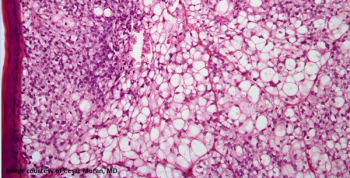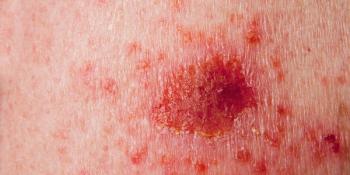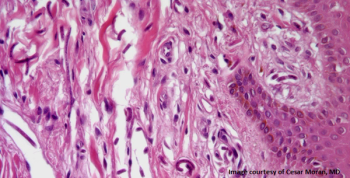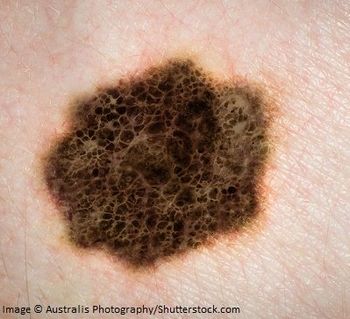
A 54-year-old woman is found to have a skin lesion in the right arm. What is your diagnosis?

Your AI-Trained Oncology Knowledge Connection!


A 54-year-old woman is found to have a skin lesion in the right arm. What is your diagnosis?

A novel immunotherapy antibody was safe and showed modest antitumor activity in a phase I clinical trial in advanced melanoma.

Waiting as long as 3 months from a melanoma diagnosis to sentinel lymph node biopsy had no effect on 5-year survival or sentinel node positivity rate, according to the results of a study.

Ironically, the patients who can benefit the most from CLND in terms of regional nodal basin disease control are the patients who are least likely to experience a survival benefit.

CLND as standard of care for patients with SLN-positive metastatic melanoma is supported by a wealth of compelling prospective data.

Objective tumor responses to pembrolizumab (Keytruda) and nivolumab (Opdivo) are associated with longer times between melanoma diagnosis and treatment.

An experimental checkpoint inhibitor called avelumab may produce quick and durable responses in some patients with metastatic Merkel cell carcinoma.

A large percentage of patients with metastatic melanoma in Europe may not have access to innovative medicines used to treat the disease, according to the results of a survey.

Melanoma patients diagnosed prior to age 18 had a higher survival vs adult patients, despite having similar tumor depth and more frequent nodal metastases.

Researchers at Moffitt Cancer Center in Tampa, Fla., demonstrated how novel immune and targeted therapies with radiation therapy may improve the outcomes of patients with melanoma who have brain metastases.

Combining the BRAF inhibitor encorafenib with the MEK inhibitor binimetinib may significantly improve progression-free survival in BRAF mutant melanoma, according to a new phase III trial.

Lack of knowledge and a belief that dark skin protects against skin cancer are among the barriers preventing minority, uninsured, and immigrant populations from adopting methods for skin cancer prevention.

The use of sunscreen with an SPF of 15 or greater was associated with about a 30% reduction in the risk for melanoma among a group of Norwegian women.

Researchers from the University of Virginia Cancer Center are now reporting that the experimental agent pevonedistat may be able to combat melanoma in whole new way.

Researchers at the Massachusetts Institute of Technology have engineered a remote control switch that uses ultraviolet (UV) light to activate CRISPR-Cas9 gene editing.

Oral vitamin D intake was associated with an increased risk for basal cell carcinoma, but not melanoma, according to two large cohort studies.

Scientists from the Ohio State University (The James) Comprehensive Cancer Center and Perlmutter Cancer Center of NYU School of Medicine have found an association between genes linked to eye color and development of uveal melanoma.

A new study is suggesting that it may be possible to turn melanoma into a nonthreatening, easily curable disease.

A 47-year-old man presents with an “atrophic” lesion of the skin in the right arm. After a biopsy is performed, what is your diagnosis?

Immune response markers from on-treatment-but not pretreatment-melanoma biopsies predict responses to immune checkpoint blockade.

Updated efficacy results of the coBRIM trial showed that cobimetinib plus vemurafenib improved survival in patients with BRAF V600–mutated advanced melanoma.

There is currently not enough evidence to assess the balance of benefits and harms of a visual skin examination by a clinician to screen for skin cancer in asymptomatic adults.

In this interview we discuss a recent study that identified genetic mechanisms of immunoresistance to treatment with anti-PD-1 antibodies.

Patients with metastatic melanoma may benefit from the addition of a local tumor-targeted treatment in addition to ipilimumab.

Obtaining blood biopsies instead of invasive tissue biopsies may be less risky for patients, faster, and cost less.